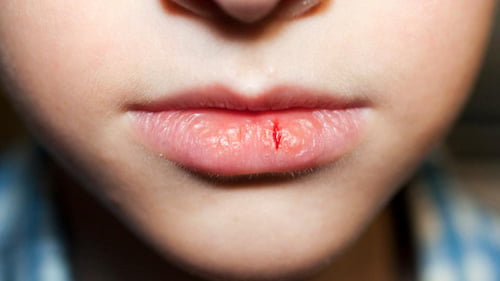Dryness: The most common cause is dry air, particularly during cold, windy weather or in arid climates. Dry air can lead to moisture loss from the lips, making them dry and prone to cracking.
Licking Lips: Constantly licking your lips might seem like a quick fix for dryness, but saliva actually contains enzymes that can further irritate and dry out the delicate skin on your lips.
Dehydration: Not drinking enough water can cause dehydration, leading to dry lips among other symptoms.
Sun Exposure: Just like the rest of your skin, your lips can get sunburned. Prolonged exposure to the sun's UV rays without protection can lead to dryness, peeling, and even long-term damage.
Allergic Reactions: Some people may develop cheilitis as a result of an allergic reaction to certain lip products, such as lipsticks, lip balms, or toothpaste.
Vitamin Deficiencies: In some cases, deficiencies in certain vitamins, particularly B vitamins or iron, can contribute to chapped lips.
Medications: Certain medications, such as retinoids used for acne treatment or certain chemotherapy drugs, can cause dryness and chapping of the lips as a side effect.
Medical Conditions: Certain medical conditions, such as eczema, psoriasis, or fungal infections, can also cause chapped lips.

Stay Hydrated: Drink plenty of water throughout the day to keep your body and lips hydrated.
Use a Humidifier: If you live in a dry climate or during the winter months when indoor heating can dry out the air, using a humidifier can help add moisture to the air and prevent your lips from drying out.
Avoid Licking Your Lips: Although it may provide temporary relief, licking your lips can actually worsen chapping because saliva evaporates quickly, leaving your lips even drier.
Protect Your Lips: Use a lip balm with SPF to protect your lips from the sun's harmful UV rays. Apply lip balm regularly, especially before going outside in cold or windy weather.
Exfoliate Gently: Use a gentle lip scrub or a soft toothbrush to exfoliate your lips and remove dead skin cells. Be careful not to overdo it, as excessive scrubbing can further irritate your lips.
Moisturize Regularly: Apply a thick layer of lip balm or ointment with ingredients like beeswax, shea butter, or petrolatum to lock in moisture and keep your lips hydrated.
Avoid Harsh Ingredients: Some lip products contain ingredients that can irritate chapped lips, such as menthol, camphor, or fragrances. Opt for products with gentle, hypoallergenic ingredients instead.
Stay Consistent: Apply lip balm regularly throughout the day, especially after eating, drinking, or washing your face.
Consider Your Diet: Eating a balanced diet rich in vitamins and minerals, particularly vitamin E and omega-3 fatty acids, can help promote healthy skin, including your lips.
Seek Medical Advice if Needed: If your chapped lips are severe, persistent, or accompanied by other symptoms such as bleeding, swelling, or infection, it's best to consult a healthcare professional for proper diagnosis and treatment.
Coconut Oil: Apply a small amount of virgin coconut oil to your lips several times a day. Coconut oil has moisturizing properties that can help soothe and heal cracked lips.
Honey: Honey is a natural humectant, meaning it helps retain moisture. Apply a thin layer of raw honey to your lips and leave it on for 15-20 minutes before gently rinsing off with warm water.
Aloe Vera: Aloe vera gel has soothing and healing properties. Apply a small amount of pure aloe vera gel to your lips several times a day to help relieve pain and promote healing.
Shea Butter: Shea butter is deeply moisturizing and can help repair cracked lips. Apply a small amount of raw shea butter to your lips and leave it on overnight for best results.
Cucumber Slices: Place thinly sliced cucumber over your lips for 10-15 minutes. Cucumber has hydrating properties that can help moisturize and soothe cracked lips.
Olive Oil: Apply a small amount of extra virgin olive oil to your lips and massage gently. Olive oil is rich in antioxidants and fatty acids that can help repair and protect cracked lips.
Castor Oil: Castor oil is known for its moisturizing and healing properties. Apply a small amount of castor oil to your lips before bedtime and leave it on overnight.
Green Tea Bags: Steep a green tea bag in hot water for a few minutes, then let it cool slightly before placing it over your lips for 5-10 minutes. Green tea has antioxidant properties that can help reduce inflammation and promote healing.
Drink Plenty of Water: Staying hydrated is essential for overall skin health, including your lips. Drink plenty of water throughout the day to help keep your lips hydrated from the inside out.
Avoid Irritants: Try to avoid licking your lips, as saliva can further dry them out. Also, avoid lip products with harsh ingredients, fragrances, or allergens that could irritate cracked lips further.
Does stress cause lips to crack?
How often should lip balm be applied?
Why do lips crack in summer?